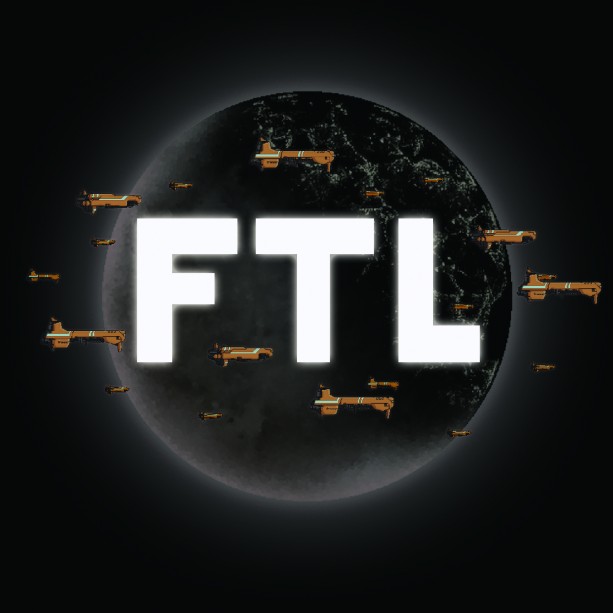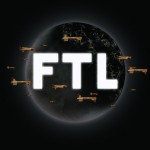 Where are all the hard games these days? Games are too easy now, gamers are lazy and designers just want to hold your hand and make you play through a ten hour tutorial where you can’t die. Right? Well you may say that, but after a few minutes of FTL, when you’re looking at a cold, lifeless chunk of debris that used to be your ship floating through space with little blue asphyxiated astronauts drifting into eternal silence, you might change your mind. FTL is addictive, old school and absolutely fucking brutal.
Where are all the hard games these days? Games are too easy now, gamers are lazy and designers just want to hold your hand and make you play through a ten hour tutorial where you can’t die. Right? Well you may say that, but after a few minutes of FTL, when you’re looking at a cold, lifeless chunk of debris that used to be your ship floating through space with little blue asphyxiated astronauts drifting into eternal silence, you might change your mind. FTL is addictive, old school and absolutely fucking brutal.
I started playing the new XCOM after many hours of FTL, and while my Twitter feed filled with friends saying that they found the new Firaxis title teeth-gnashingly difficult, I had to laugh. You think fighting aliens on Earth is tough, wait till you get into space!
 Appearing as one of the first crowd-funded games, FTL has an interesting development story. Setting that aside though, the result of this process is a game that feels like it has been tested and refined over a long period of playtesting to remain engaging and addictive from start to finish, as well as ruthlessly challenging.
Appearing as one of the first crowd-funded games, FTL has an interesting development story. Setting that aside though, the result of this process is a game that feels like it has been tested and refined over a long period of playtesting to remain engaging and addictive from start to finish, as well as ruthlessly challenging.
The setup of for FTL is that you have to cross the galaxy, flying through one dangerous system after another, all the while pursued by a fleet of murderous Rebels, to deliver a message to the friendly Alliance. The Rebels have a fleet bigger than Xur and the Ko-Dan Armada so you have to move faster than a Bothan with a stolen plan to a super weapon. You have nothing but your under powered ship, your crew and your judgement of how to handle difficult situations to get you to safety.
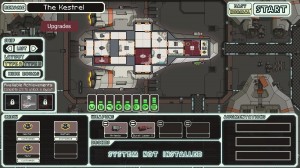 Described everywhere in the universe as a “Rogue-like” game, its worth taking a moment to describe its central gameplay for those (like me) who have played thousands upon thousands of old games, but never played Rogue. You are presented with a map of star systems and you pick one. You then warp jump there, and you are generally then either attacked by an enemy ship or presented with a choice. Generally, these choices are things like “Will you help the space station fight off the pirates?”. Depending on your answer you will then either fight, or simply jump away and leave the poor people to die. Other times you might find ships in distress that you can choose to help, often with some kind of associated risk.
Described everywhere in the universe as a “Rogue-like” game, its worth taking a moment to describe its central gameplay for those (like me) who have played thousands upon thousands of old games, but never played Rogue. You are presented with a map of star systems and you pick one. You then warp jump there, and you are generally then either attacked by an enemy ship or presented with a choice. Generally, these choices are things like “Will you help the space station fight off the pirates?”. Depending on your answer you will then either fight, or simply jump away and leave the poor people to die. Other times you might find ships in distress that you can choose to help, often with some kind of associated risk.
The tricky part here then is choosing when to fight and when to run. Fighting the wrong enemy can result in a painfully quick death as your little dudes see their precious ship pulverized in seconds. It seems that in space, sometimes its best to tune your radio to some classic FM and ignore the broadcasts of those who are being sucked into a black hole, fried by a solar flare or boarded and enslaved by pirates.
The presentation of the action is retro, with little sprites depicting your crew and some soothing blinky space music present throughout that evokes older, bleaker, harder games from the PC’s past. The whole game is played from a top down view of your ship where you can see the various sections like shields and engineering and move your crew member around to where they are most needed. You can also reroute power to different systems, and power management becomes the key element in determining your success or failure as a ship captain.
 The complexity of the combat depends on how many upgrades your ship has. If you progress far enough you will be dispatching drones, using cloaking devices and even beaming board teams onto enemy ships. Early on though, you will be more concerned with moving your crew around, as a manned ship system performs better than an unmanned one. For example, if your shields are manned then they will recharge faster. Crew members are also required to fight fires, or enemy troops who board your ship. If fires get out of control an alternative way of fighting them is to open airlocks and let the oxygen out into space.
The complexity of the combat depends on how many upgrades your ship has. If you progress far enough you will be dispatching drones, using cloaking devices and even beaming board teams onto enemy ships. Early on though, you will be more concerned with moving your crew around, as a manned ship system performs better than an unmanned one. For example, if your shields are manned then they will recharge faster. Crew members are also required to fight fires, or enemy troops who board your ship. If fires get out of control an alternative way of fighting them is to open airlocks and let the oxygen out into space.
The strength of the game then is in the split second decisions you make to try and keep your ship running as it sustains damage. It’s a game about crisis management, where high risk decisions (like turning off life support for a few minutes to divert more power to shields) can be the difference between surviving long enough to jump to safety or your lifeless ship spiralling into the flaming embrace of a red dwarf.
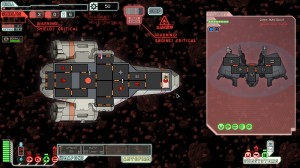 And its old school hard. I played over and over on the normal difficulty, and the semi-random nature of the encounters almost always saw me face infeasibly horrible situations after just a few jumps. Seeing your little crewmen die is horribly affecting, and when they suffocate because they continued to man a system till their dying breaths to save the rest of the crew, you can’t help but think of something like Spock’s heroic death in Wrath of Khan.
And its old school hard. I played over and over on the normal difficulty, and the semi-random nature of the encounters almost always saw me face infeasibly horrible situations after just a few jumps. Seeing your little crewmen die is horribly affecting, and when they suffocate because they continued to man a system till their dying breaths to save the rest of the crew, you can’t help but think of something like Spock’s heroic death in Wrath of Khan.
I wonder if its too hard though? On easy, I made good progress in one particular mission until things went epically wrong. In this case I had went to the effort of customising my crew and ship by naming them all. Big mistake. I watched in abject horror as, after a tough battle with an enemy ship, all three of my almost-dead crew huddled in the engine room, the only part of the ship not consumed by fire. My oxygen was running out as that system had been damaged. Not one of my crew had enough health to fight through the fire to get to life support and repair it. Their only option was to fix the repair drone, which could then fix life support. As they tried to make their way there though, fire had spread at the last moment to the room ahead of them. If I could have healed them in sick bay they would have enough health to fight the fire, but THAT had just gone on fire too! So they sat together, huddled in the engine room, waiting to die. Too fucking bleak!
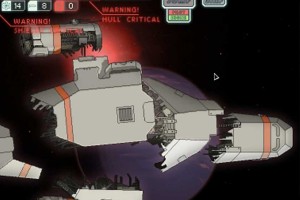 But even if it was hard and painful and depressing, I remember that mission, and that story. If there’s something great about the games that have been crowd funded and have rabid fan bases, its that they are often titles where we write our own stories rather than follow others. Even the new XCOM is a game where your little randomly named troops develop a story of their own that you write. Uncharted, Call of Duty and other highly cinematic games are great in that they can tell you a story, but games like FTL let you write your own. Sure, that story might be more Silent Running than Star Wars, but that’s no bad thing.
But even if it was hard and painful and depressing, I remember that mission, and that story. If there’s something great about the games that have been crowd funded and have rabid fan bases, its that they are often titles where we write our own stories rather than follow others. Even the new XCOM is a game where your little randomly named troops develop a story of their own that you write. Uncharted, Call of Duty and other highly cinematic games are great in that they can tell you a story, but games like FTL let you write your own. Sure, that story might be more Silent Running than Star Wars, but that’s no bad thing.
8 asphyxiated floating space dudes out of 10
